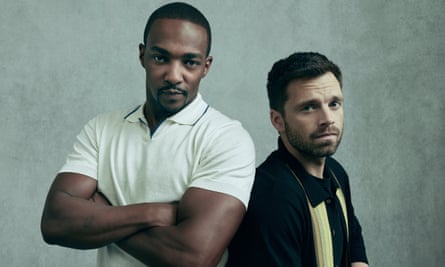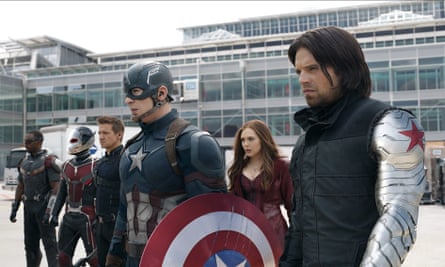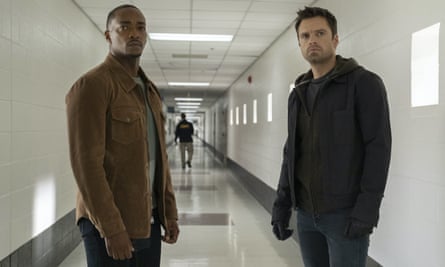Sebastian Stan, AKA Bucky Barnes, AKA The Winter Soldier, is attempting to characterise his relationship with his on-screen partner Anthony Mackie, AKA Sam Wilson, AKA The Falcon: “I grew up with buddy comedies like 48 Hours, Coming to America, you know, Lethal Weapon, Turner and Hooch. All those movies I grew up with. So for me, it was like I was making an 80s film with Anthony Mackie.”
By this stage, Mackie is laughing his head off in a separate Zoom window: “We’re definitely the Turner and Hooch of the Marvel Universe. That’s the perfect description of who we are.”
For the uninitiated, in the 1989 comedy, Turner was a detective played by Tom Hanks and Hooch was a big, unruly dog. So who’s the latter?
“Oh man, I gotta rewatch that movie now,” says Stan.
“He went too far with Turner and Hooch”, reckons Mackie. “I would say Starsky and Hutch.”
Old superheroes never die; they just get recast. Or they miraculously survive the incident that supposedly killed them off. Or, increasingly, they come back for their own small-screen spin-off. The last two, if not the first, apply to Mackie and Stan’s double act The Falcon and The Winter Soldier. In the Marvel movies, both characters were always in the shadow of Chris Evans’s Captain America – two Hooches to his Turner. Bucky Barnes made his entrance as Cap’s wartime comrade in 2011’s Captain America: The First Avenger. He supposedly died in that movie, only to return as Captain America’s brainwashed, metal-armed nemesis The Winter Soldier in 2014. Mackie’s winged war veteran Sam Wilson entered the story at that stage, and both characters soldiered through numerous Marvel campaigns (Ant-Man, Black Panther, Captain America: Civil War) before being vaporised at the end of Avengers: Infinity War. Fortunately they survived that, too.
Now, in the absence of Evans, they are back for a six-part Disney+ series that seeks to continue not just their stories but the whole Marvel machine. Having held the movie world’s attention with the Avengers saga, Marvel is gambling on doing the same on the small screen. Hot on the heels of the well-received WandaVision, The Falcon and the Winter Soldier is a doubling down, with a reported budget of $25m per episode – almost twice as expensive as The Crown.
In the time-honoured buddy tradition, Mackie’s Falcon and Stan’s Winter Soldier are initially reluctant partners, to the extent they can’t even agree to call themselves partners. They settle on “co-workers”. “They’re cut from different cloth, so to speak, and have to find a way to coexist and work together,” says Stan, “and to some extent, that’s what Anthony and I have had to do for the last seven years or whatever we’ve been working together.”
Stan is speaking from Vancouver. His generic Zoom background is of a tropical beach. Mackie is at his home in New Orleans, in what looks like a sports bar. If nothing else, they have learned to laugh at each other. Stan mocks Mackie for his incessant cigar-smoking on set; Mackie ribs Stan about his antisocial tendencies, and the fact that his Winter Soldier arm prop (basically a metal-effect sleeve) is “the most disgusting thing in the history of cinema”. Do they ever socialise together?
“We’re never really in the same city,” says Stan. “I think that’s maybe one problem. Although Anthony did invite me to come fishing with him.” His voice cracks into a groan: “And I know that I have to do that, at some point.”
“It’s a bone of contention that he won’t let me take him fishing,” Mackie admits. “I think it would be amazing for Sebastian to just sit in the wilderness and think about everything that’s going on.”
Stan: “He’ll be like: ‘Keep going, don’t worry, a little further,’ and I’ll be like: “Why do I feel like he’s gonna shoot me in the back?’ Like that scene in Goodfellas.”

Mackie [imitating De Niro in Goodfellas]: “Right around the corner. Right there.”
Stan: “Just you and I, having an overnight fire, camping … ”
Mackie: “See? That’s all I want. What’s the worst that could happen? You could get chased by a wild boar.”
They continue mocking each other until both are collapsed in laughter. Ex-military types might recognise this condition as “demob-happy”. It must be a weird thing to be playing the same characters on and off for the best part of a decade, especially in the secretive world of an open-ended mega-franchise such as Marvel. Both actors have done good work in between: Stan in The Martian and I, Tonya; Mackie in Detroit and The Hate U Give. But neither felt “done” with Marvel, they say. True to their characters’ military origins, there is a feeling of being on permanent standby, always ready to be called up for another mission.
“But once you get that call, it’s sort of like Christmas morning,” says Stan.
Mackie agrees. “I’ve played this character for so long I know him inside and out. So to build on that with more story, more arc, more background, every time you revisit them, it becomes easier. When you go into a new character it’s much more work because you have to start from the ground up.” The exposure has also benefited his career: “There are so many people who I run into who had never seen me in anything until they saw me as Sam Wilson, and then they went back and watched other stuff.”
Any doubts about returning were assuaged by the fact that this is a small-screen outing with big-screen values. As well as buddy comedy we can expect white-knuckle action sequences (the opening episode pitches Falcon into a spectacular aerial chase involving helicopters, flying suits and missiles) and new locations (a trip to the fictional south-east Asian city of Madripoor is on the cards), although where the six-part story will go remains unknown.
The Captain America movies were always the “serious” backbone of the Marvel stories, reflecting current themes of military overreach, surveillance, patriotism and loyalty to the flag. In 2014’s The Winter Soldier, Captain America turned against his corrupted government and went rogue. Both Falcon and the Winter Soldier sided with him. If it’s minded to continue in that direction, The Falcon and the Winter Soldier has plenty to chew on, given the recent era of Black Lives Matter, taking the knee, Trumpism and far-right nationalism. Alongside other returning characters (Emily VanCamp’s Sharon Carter, Daniel Brühl’s villain Baron Zemo), the series introduces “US Agent”, played by Wyatt Russell. In his various incarnations in the comics, he has been both a super-patriotic nemesis to Captain America and also his successor. Also thrown into the mix are a group calling themselves “the Flag-Smashers”, whose name and comic-book heritage suggests another element relating to nationalism.

“That’s another undercurrent that I love about the show,” Stan says. “It’s about deeper things than just symbols. You can’t just take symbols and justify actions by them.”
Following the tragic death of Chadwick Boseman, AKA Black Panther, Mackie is now the most prominent Black character in the Marvel Universe, which also gives his story extra weight. Marvel president Kevin Feige has acknowledged as much: “What had been a classic passing of the torch from one hero to another at the end of Endgame [where Evans’s Captain America handed his shield to Mackie’s Falcon, as if anointing him as his successor] became an opening up of our potential to tell an entire story about that,” he said. “What does it really mean for somebody to step into those shoes, and not just somebody, but a Black man in the present day?”
Since his debut in 1941, Captain America has been the literal poster boy for US militarism; the embodiment of (white) American values. Putting a Black man in the role is no small gesture. “The patriotism aspect is a very big part of my character,” says Mackie. “You have to remember, when you first met him he was a counsellor for soldiers trying to re-acclimate from war. And with Wyatt’s character, there’s a certain mutual admiration that comes along with both of them being ex-military. So, definitely, you can expect more of that.”
As for becoming Marvel’s most prominent Black superhero, Mackie expertly deflects the question: “I never thought about the passing of Chadwick being an opportunity for Sam Wilson,” he says. “Chad and I had a lot in common, being from the south and being classically trained from the theatre. I think that’s why we grew so much as individuals, because there was an understanding. So, I would like to keep up his legacy as an individual human being and as a man, more than keeping up his legacy as Black Panther.”

There is another, less intentional way in which the ongoing Avengers saga resonates with the present moment. The Falcon and the Winter Soldier is set in the aftermath of “The Blip” – Thanos’s mass extinction event, as a result of which half the population effectively disappeared for five years, then returned. “The show deals with our characters coming back after The Blip and trying to figure out what’s their new normal in this new society,” says Mackie. “And that’s exactly what we’re dealing with today with Covid.”
It was a case of life imitating art. The show was written (by Malcolm Spellman, best known for hip-hop series Empire) a good 18 months ago. Shooting in Prague had been under way for six months before being shut down by local Covid restrictions last March. They had to wait until September to complete the shoot, under socially distanced, quarantined conditions.
With most cinemas closed, this is a fortuitous time for superheroes to be migrating to the small screen. In the pipeline are shows centred on Tom Hiddleston’s Loki, She-Hulk and Ms Marvel, among others. Which leads to the inevitable question: is there another Avengers-style, multi-title masterplan unfolding here? Do Stan and Mackie have a sense of the bigger picture?
“I don’t think we do, honestly,” says Stan.
“We know that there’s going to be a big movie with a bunch of heroes and shit blowing up,” Mackie says. If he really is the next Captain America, he’s either none the wiser or he’s using that superpower known as “acting”. Either way, he’s not letting on: “I haven’t seen the final cut of the last episode. So I don’t know if I die yet. But … I hope I don’t.”
Stan: “Yeah. Hopefully we all make it.”
Mackie: “Hopefully.” They’re both laughing again. “Just trying to stay alive, brother.”
Stan: “That’s right. A day at a time.”
Let’s wait and see. But if this is the end of the road, there’s at least potential for a reality show: Fishing With Mackie and Stan, anyone?
New episodes of The Falcon and the Winter Soldier are available Fridays on Disney+

Comments (…)
Sign in or create your Guardian account to join the discussion